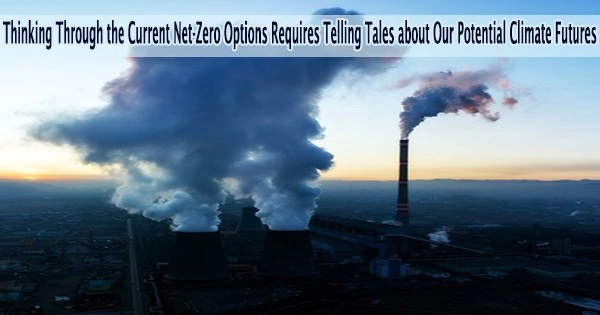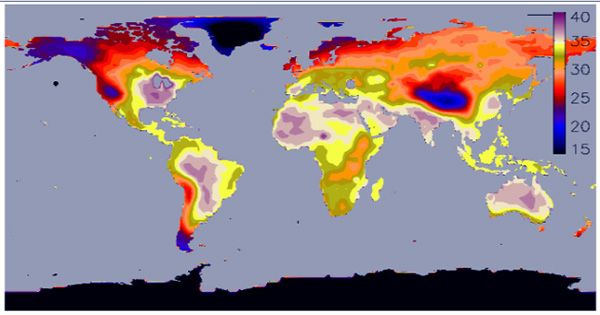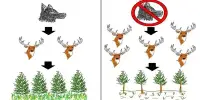Everywhere in the world, people have felt the disastrous effects of climate change that climate scientists have been warning about for years. The terrifying possibility is that we are about to enter a “new abnormal.”
While there are other political and economic challenges that must still be overcome, climate change observers and those who are affected by it are desperate for action. But what is even more obvious is that we don’t have a clear picture of the future to direct our efforts to combat climate change.
To be clear, it is not for lack of goals.
Net Zero by 2050. 1.5 C above pre-industrial levels. A 40 percent reduction of 2005 greenhouse gas emissions by 2030. All of these objectives are excellent, but they do not offer individuals a way to see, feel, or comprehend where we are going.
Stories that can help make those ideals a reality are needed by Canadians and people all over the world. Stories that can foster the necessary national dialogue on the vast changes that are about to take place.
The power of story
The importance of tales and imagination in promoting climate change is being increasingly determined by social science and humanities studies.
Indeed, one study found: “Transformations require the capacity to collectively envision and meaningfully debate realistic and desirable futures. Without such a collective imagination capacity and active deliberation processes, societies lack both the motivation for change and guidance for decision-making in a certain direction of change.”
Creative writers have been responding to this need for vision through stories. The field of utopian and dystopian climate fiction has grown too large and diversified to be briefly reviewed with books, short tales, and literary competitions.
Some works, such as Kim Stanley Robinson’s novel Ministry for the Future, have even found themselves in mainstream conversations endorsed by prominent figures like Barack Obama while climate change is also increasingly a motif in novels that are not necessarily about climate change.
Scholars are keenly aware of this trend and have been studying its impacts and contributing stories themselves.
A project at Lund University in Sweden developed a Museum of Carbon Ruins, projecting forward to a post-carbon future and envisioning how we will look back upon our world today, while Cree scholar Sandra Lamouche’s research explores how Indigenous storytelling can inform climate policy and action.
Transformations require the capacity to collectively envision and meaningfully debate realistic and desirable futures. Without such a collective imagination capacity and active deliberation processes, societies lack both the motivation for change and guidance for decision-making in a certain direction of change.
Stories have a significant impact on how we act in the present and how we perceive the future. They have the power to bring the future into being and make the path leading there evident. They can make the abstract physical, act as cautionary signs, and serve as cautions.
As Alexandra Nikoleris, Johannes Stripple, and Paul Tenngart argue in a recent piece comparing climate fiction and scientific reports on climate futures, “Through identification with the protagonists in literary fiction, climate futures become close and personal rather than distant and abstract.”
The role of story in action
At present, Canada has a legislated goal of achieving net zero by 2050. Policies are being made and billions are being spent and pledged. This is a good thing. Canada desperately needs to move quickly in its pursuit of climate action. There are think tank papers, an advisory council, and several partisan-biased opinion pieces to aid governments and Canadians in analyzing what this means for them.
What is missing are stories. Stories of how we might get there. Stories of what might go wrong along the way. Stories of what net zero looks like. Stories on what may still need to be done once we arrive. stories that enable individuals to relate political choices and sociotechnical developments to their lives both now and throughout Canada’s transition to net zero.
At the Environmental Governance Lab at the University of Toronto, we are contributing to filling this gap with the first volume of a speculative fiction magazine set in an imagined 2050 in a Canada that has achieved its net-zero goal, We Did It!?.
The stories, which were created as a result of a series of workshops with authors, social scientists, and technological experts, take into account various facets of how Canada reached net zero, what life is like today, and the work that has to be done in order to build a just and equitable low-carbon society.
The tales in the magazine address the tensions, challenges, and opportunities encountered in the goal of net zero through profiles and human interest pieces, poetry, a movie review employment ad, and more. Some are stories of what goes wrong. Others explore what the good life in 2050 might look like.
Taken together they personalize the policies and technical shifts that are all too often remote and removed. They make concrete the social, political, and economic dynamics that are all too often abstract. The goal is to spark the imagination and conversation about what climate action can and will mean for Canadians.
An ongoing discourse
This is the first volume of what will hopefully be many. We intend to delve further into Canada’s net-zero path and introduce the future history storytelling method to a variety of audiences and storytellers, including secondary students who are concerned about climate change.
Stories are not just visions or flights of imagination. They can serve as a reflection of our understandings, aid in decision-making, and help us perceive potential courses of action, contingencies, and outcomes. They give human stories to technical studies that are typically devoid of them while ignoring the viewpoints and comprehension of individuals who actually experience the impacts of those policies.
They can alter our perception of what is possible, open a door for us to hear fresh perspectives, and compel us to consider our hopes and anxieties. We need more stories to help us comprehend and reflect on where we are heading and how we get there if we are to change the story of climate damage and misery that we read every day.
After all, as Robinson reminds us, “We decide what to do based on the stories we tell ourselves.”
















